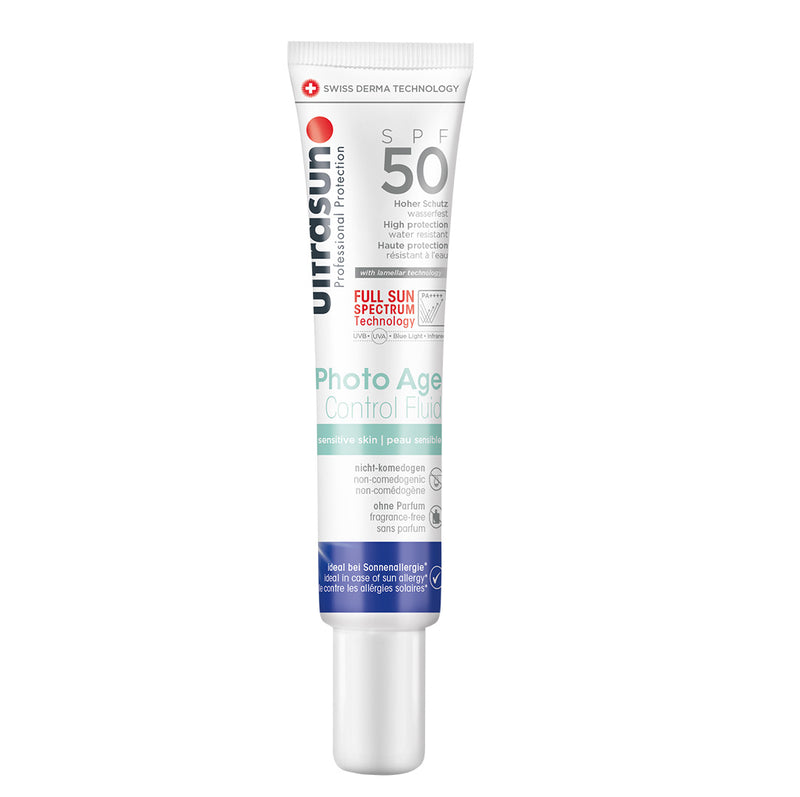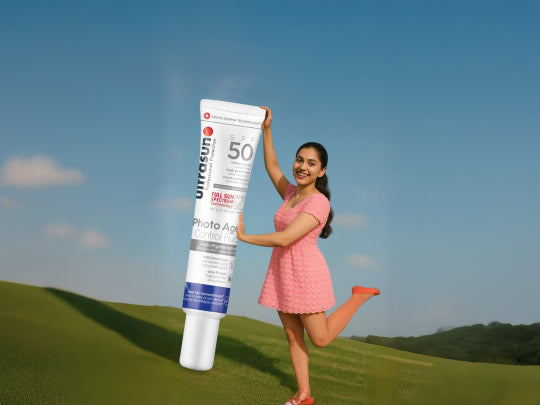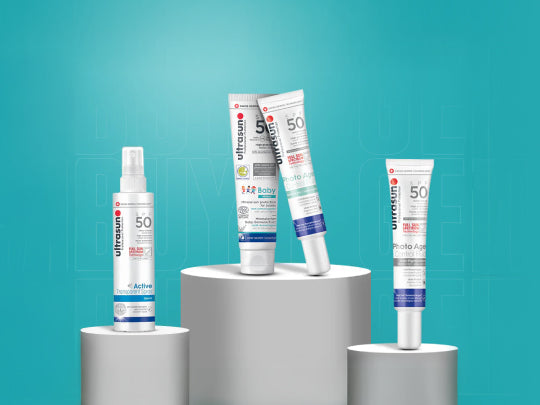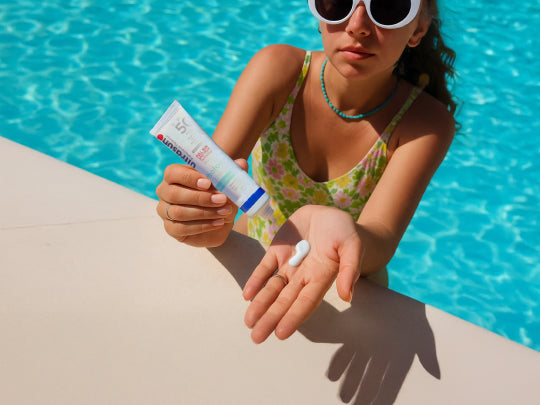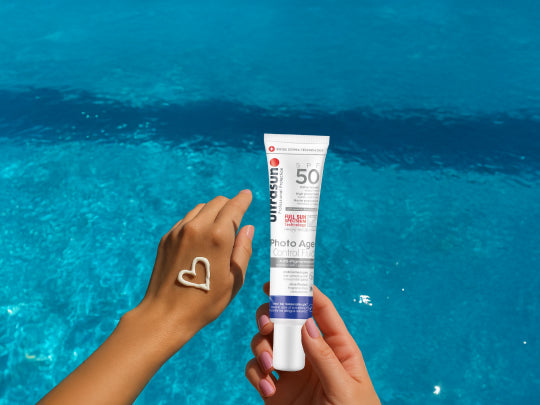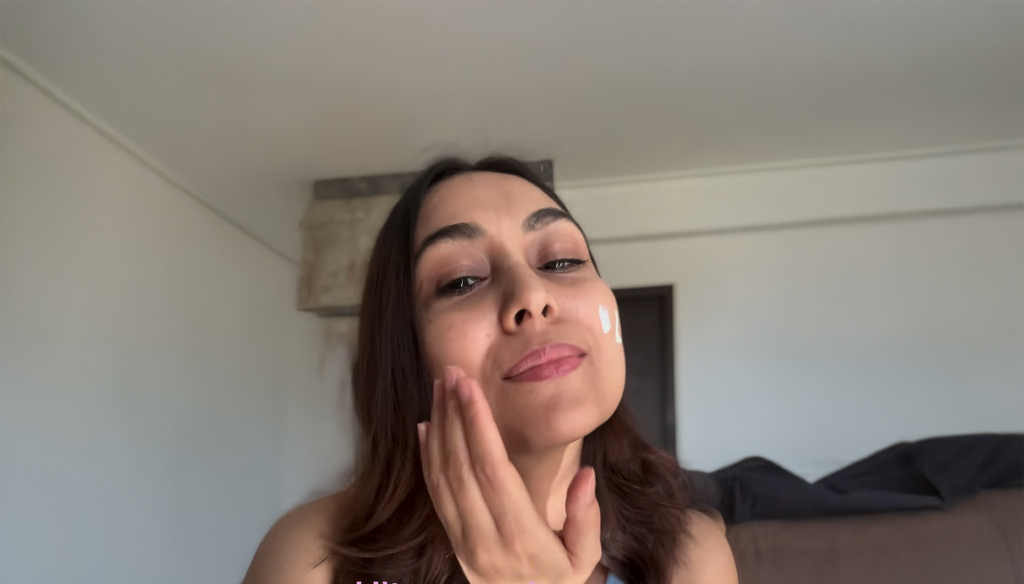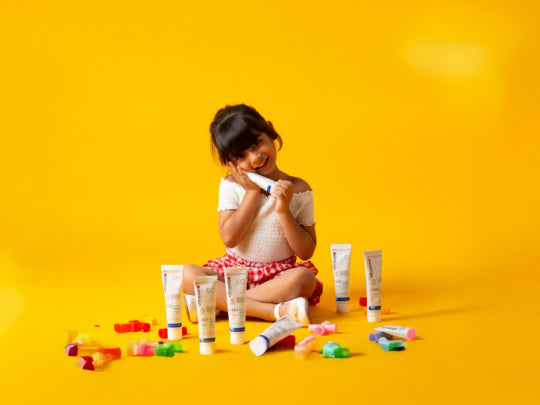Finding the perfect Sunscreen for Oily skin in India is very difficult for anybody because if the correct skin care products are not selected, it causes many skin problems, like acne and pimples. Choosing the best Sunscreen for Oily, acne-prone skin is the most challenging task. We will see this later. First of all, we need to get answers to some other questions related to Oily skin.

First of all, you need to know if you have Oily skin or not.
Here is the test.
If your skin looks and feels greasy and shiny after a few hours of washing your face, then you have oily skin.
When you have oily skin, the sebum (oil) producing glands are overactive and produce more oil than usual. Sebum (oil) protects the skin. It nourishes and moisturizes the skin naturally. However, sometimes sebum production can increase or decrease due to various hormonal and diet-related reasons. If sebum production is less, then the skin becomes dry. If it is more, then the skin looks shiny and greasy.
Here are a few pointers that will help you identify oily skin –
- Greasy or shiny face
- Large pores on the skin
- Skin is rough and thick to the touch
- Pimples
- Regular blackheads & whiteheads
Best Sunscreen For Oily Skin Dermatologists Recommended In India 2024
In India, there are so many sunscreen products, but dermatologists recommend ULTRASUN BRAND , which is the BEST sunscreen for Oily skin.
Ultrasun, a premium Swiss Care Brand, has launched gel-based sunscreen for oily, sensitive, and acne-prone skin.
- Easy to Use: Apply 15-30 minutes before sun exposure. It provides 7+ hours of sun protection.
- Protects Your Skin: Ultrasun Photo Age Control Fluid - Sensitive Skin SPF 50 protects your skin from UVA, UVB, Infrared & Blue Light rays with Advanced Lamellar Technology. It provides broad-spectrum sun protection and has GSP-T for infrared protection.
- Sunscreen For Oily Skin: Non-comedogenic and Non-allergenic (Causes no skin pore clogging and no allergic reaction).
- Non-greasy: Fast absorbing and lightweight without leaving a greasy residue.
- Approved By The Best: AHA & NATRUE certified.
- Made in Switzerland: Advanced Swiss Suncare.
- Fragrance-Free: It does not contain perfume.
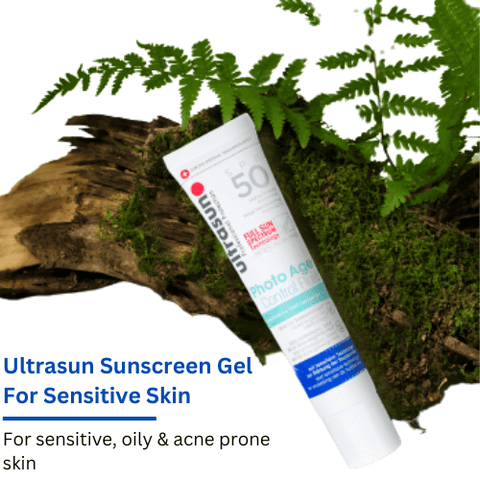
How to choose the best sunscreen for oily skin with SPF 50 in 2024
Choosing the best and perfect sunscreen SPF 50 for oily skin in India is very difficult because we don’t know what to choose. When you go to a beauty store or online to choose a good sunscreen for your oily skin, looking at the pack and the claims that the sunscreen is making, the technical terms and numbers mentioned do not make sense. You only know that more is good and the lower price you have to pay is best, but is it?
Don’t worry, we have you covered. Here are the most common sunscreen terms and what they mean. This will help you choose the best sunscreen for your oily skin :
UVA PROTECTION -
- The question you might have in your mind when seeing this -
- What is UVA protection?
- Difference between PA+++ and PA++++
- What if no PA value is mentioned on the sunscreen
Let’s talk about this
UVA is one type of light that causes skin aging and cancer. According to dermatologists UVA light “does not burn, but is sneaky and penetrates deeper than UVB, accelerating the aging of your skin and causing skin cancer.” UVA rays also contribute the most to our UV exposure. The PA rating tells how much the sunscreen protects from UVA light. A sunscreen with no PA rating will not protect from UVA light. You should not buy this sunscreen as even after applying the sunscreen properly you will get no protection from UVA rays and this will increase skin aging and might cause skin cancer. The more plus signs that follow PA, the better. PA ++++ offers the maximum UVA protection, and PA + the least.
SPF 50
- You might have in your mind when seeing this-
- What does SPF 50 mean?
- Do I need SPF 50 or SPF 30?
- Does more SPF mean the Sunscreen is better?
Read on -
UVB light causes sunburn and is mostly responsible for tanning. It is more intense than UVA light. SPF tells you how much UVB light is filtered out. You can get to know by its number how long you can stay in the sun without your skin burning. It does not completely protect your skin from skin damage due to sun rays as there are many other variables to solar radiation. Instead, we should only use SPF as a comparison: A higher SPF provides more protection than a lower SPF. According to Jeremy A. Brauer, a board-certified Manhattan dermatologist, “SPF 30 blocks 97% of UVB rays, SPF 50 blocks 98%.” Keep in mind that no sunscreen can block 100 percent of UVB rays.
Broad Spectrum Sunscreen
- What does the term Broad Spectrum mean?
- Do I need a Broad spectrum sunscreen?
The term broad-spectrum sunscreen means that the sunscreen protects against both UVA and UVB light. All sunscreens which show an SPF rating block UVB but different ingredients are needed to block UVA rays. The sunscreen you choose must be broad-spectrum sunscreen as both UVA and UVB rays can cause cancer.
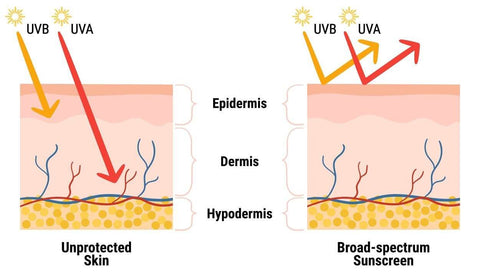
Mineral Sunscreen
- What is a Mineral Sunscreen?
- Is it any different from normal sunscreen?
- Should I use mineral sunscreen?
Mineral sunscreen is a sunscreen that does not have chemical filters in it and only physical filters. Physical filters reflect the UV lights and chemical filters absorb the UV rays. The two most common ingredients in mineral sunscreens are titanium dioxide and zinc oxide. These are the only physical sunscreen ingredients recognized as safe and effective by the FDA. “Mineral sunscreens are much safer for people who are concerned about long-term exposure to chemical ingredients,” Ploch says. Chemical sunscreens are more effective than physical sunscreens but chemical sunscreens can cause allergic reactions in people with sensitive skin, and worsen melasma and rosacea.
IR protection
Infrared (IR) light radiation has a range of frequencies just below those of visible light in the spectrum. Infrared radiation may also cause the release of free radicals in the skin and accelerate aging. According to Michael Southall, Ph.D., a senior researcher at Johnson & Johnson, "traditional sunscreens, which only block UV, don't protect us from the sun's total oxidative toll."
Blue light protection
Blue light is a form of electromagnetic light that the naked eye can see. It has a short wavelength, high energy, and potent penetration power. Blue light is primarily from the sun, but it’s also emitted by smartphones, tablets, televisions, and computer screens. This form of light emission is almost as vicious as the light rays from the sun, going deeper into the dermis of the skin to cause damage over time. Regular exposure to this light, which travels at a short wavelength, may result in many skincare issues, such as premature aging.
Ultrasun has an active ingredient- InfraGard, which combines an extract of organic sunflower sprouts with highly stable antioxidants, which provide both IR and blue light protection.
Photostable
- What is a Photostable sunscreen?
- Are all sunscreens not photostable?
Have you ever wondered why some sunscreens are to be applied every 2 hours and some sunscreens are effective for 7-8 hours? The culprit here is the sunscreen filters used in the product. Cheap sunscreen filters are unstable and start deteriorating the moment sunlight falls on them.
So let’s take a scenario where when you have just applied sunscreen. It had an SPF of 30 or 50 (whatever the claim is on the bottle). After 2 hours, the SPF becomes so low that it offers no protection because the sunscreen filter has broken down. So, now you have to reapply the sunscreen to protect your skin.
There are other sunscreen agents that are expensive, but they are photostable, so they give you protection for 7- 8 hours. Eg of photostable filters are Tinosorb S, isonul A plus, zinc oxide, and titanium dioxide. Manufacturers don’t necessarily inform you as to the photostability of their products. So even though your sunscreen may be broad spectrum, a photo-unstable product could leave you at risk not only from sunburn (via UVB rays), but also from longer-term skin damage, such as photoaging, wrinkles, and even some types of skin cancers via UVA rays. Always choose sunscreens that mention that they are photostable. Or check on the back that the above photostable filters are added to the sunscreen.
All Ultrasun Sunscreens are Photostable and provide 7+ hour Protection.
Non-Comedogenic
The non-comedogenic term means that the product will not clog your skin pores and it’s very important for Oily, acne-prone skin.
Water-resistant
No sunscreen is waterproof. All Sunscreens have a time limit after which you have to reapply them as they will wash away in the water. So if you spend a lot of time in the pool or sea or you sweat a lot then it is advisable to reapply the sunscreen even if the sunscreen is water-resistant.
How to take care of oily Skin - Tips & Tricks
To properly take care of oily skin, dermatologists recommend the below tips:
1. Wash face 2 times a day
Wash your face 2 times a day especially after coming from outside or exercising. Do not use cleansing milk as they are oil-based and your skin might feel oily after using it. Cleansing milk is better on dry skin. Also, don’t use the scrub every day as it will irritate your skin. Scrub is supposed to be used only twice a week.
2. Use only non-comedogenic products suitable for oily skin-
Look for these 2 terms – ‘non-comedogenic’ and ‘suitable for oily skin’. Most cosmetic products are formulated using oil and oil-soluble ingredients and it is very important especially if you have oily skin to choose products that have low or no oil content. Also, the ingredients should not block pores.
3. Use a gentle face wash that is SLS-free -
Most people feel that for oily skin you need a strong face wash that strips all oil from your skin but such products take away all the natural moisturization of the skin and can irritate your skin and might even trigger more oil production. So the face wash needs to be mild. A good ingredient to look for in face wash is – Salicylic acid ." "Salicylic acid is lipophilic, meaning it likes oil. It gets into the pore, which is a sebaceous follicle filled with oil, and sucks the oil out," says Dr. Berson. This helps unclog the pore, making it appear smaller.
4. Do not use Cleansing milk or Alcohol based cleansers-
Do not use cleansing milk as they are oil-based and your skin might feel oily after using it. Cleansing milk is better on dry skin.
5. Use scrub twice a week
Also, don’t use the scrub every day as it will irritate your skin. Scrub is supposed to be used only twice a week.
6. Use a gel-based moisturizer-
Gel-based products are made using only water and water-soluble ingredients. These products are specially made for oily skin and should be preferred by you.
7. Use gel-based sunscreens
Sunscreen gels are the best formulation for oily skin. Ultrasun is a Switzerland-based brand that makes different Spf 50 sunscreen products according to skin type and skin concern. It is recommended by dermatologists.
8. Wear sunscreen SPF 50 every day
Sunscreens help prevent tanning and sun damage that could lead to wrinkles, age spots, and even skin cancer.
9. Remove makeup before sleeping-
Never sleep with your makeup on even when the makeup is only eyeliner and lipstick. It's very important every night for all the makeup and dirt to be removed and the skin to be clean before sleeping.
10. Never use expired makeup-
Generally colored cosmetics can last for years if you are not using them frequently. Makeup generally has 3 years expiry. Remember to buy new makeup every 3 years. Throw the foundation bottle even if it is still half filled!
11. Use a clay mask once a week-
Slathering on a clay face mask at the end of the day can do wonders for oily and mildly blemish-prone skin. Kaolin is a naturally occurring white clay that absorbs oil and helps mattify the skin. Bentonite is another effective clay that can be used. Clay masks provide gentle exfoliation. They temporarily shrink pores. Excess oil, dirt, and debris can clog pores, stretching them out and this causes open pores. While you can’t do anything to change the actual size of your pores, regular use of a clay mask can help draw out those impurities, minimizing their look.
Perfect skincare routine for Oily Skin
Whether you are a man or a woman, to treat your oily skin, you have to follow a proper skincare routine regularly and the steps are as follows:
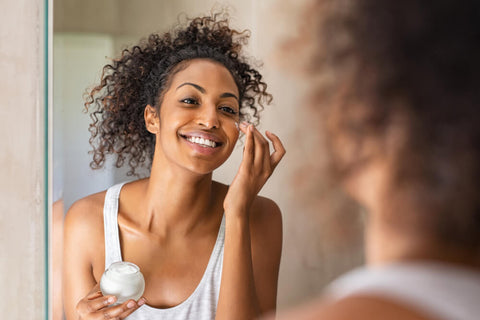
Step 1: Wash your face with a gentle cleanser
Wash your face in the morning and evening. When you sleep at night excess sebum is produced in oily skin and it is important to start your day with a clean & fresh face.
Step 2: Use an alcohol-free toner
Applying a toner is an essential step when taking care of oily skin. But check that in the toner list of ingredients ‘alcohol’ is not mentioned. Alcohol causes skin irritation on regular use. Instead, use skin-friendly ingredients like witch hazel and salicylic acid.
Step 3: Use serum
Serums are generally oil-based so they should be used with caution when you have oily skin. Choose a water-based serum.
Use a serum that has glycolic acid. It is a powerhouse ingredient for oily skin, especially when you have regular pimples. It is a mild exfoliant.
Niacinamide (vitamin B3) also lowers the sebum excretion rate
Step 4: Use a Sunscreen gel with SPF 50 and PA protection
For Oily & sensitive skin, you should use sunscreen which is in gel form. There are many sunscreens in the market but you should use the most effective sunscreen brand - Ultrasun for the best results.
Do not buy sunscreen for oily and acne-prone skin if it has these ingredients
In sunscreens, the main active ingredient is the sunscreen agent used. Here are 6 harmful sunscreen agents used very frequently in sunscreens:
1. Oxybenzone, known as benzophenone-3 - It's a hormone disruptor. It penetrates the skin very easily. Studies have been done on new mothers and oxybenzone was found in breast milk. It also enters the bloodstream. Do not use the sunscreen with this ingredient.
When you go for a swim in the ocean after applying sunscreen or showering at the end of the day, some can wash off your body and end up in waterways.
It is also harmful to aquatic life. When certain sunscreen chemicals—including Oxybenzone—contaminate aquatic environments, they may bleach or kill coral and cause reproductive issues and birth defects for fish, mussels, and sea urchins, the NOS (National Ocean Service) says.
2. Avobenzone, also a benzophenone- Avobenzone is an unstable ingredient and deteriorates very rapidly once exposed to sunlight. The breakdown of products can cause allergic reactions. It is also an endocrine disruptor and blocks the effects of testosterone( male hormone). It is also absorbed into the skin and reaches the bloodstream. Do not buy Sunscreen with this ingredient on the label.
3. Homosalate is another hormone disruptor. It stops the proper functioning of the reproductive hormones. It impairs the growth of marine wildlife e.g. sea orchids and algae so it is not safe if you use it when going to the beach. Studies have been done which showed that it caused birth defects in humans and that's why it's not recommended to pregnant women.
4. Octinoxate, known as octyl methoxycinnamate(OMZ)- is a hormone and endocrine disruptor. It was detected in breast milk, human blood, and urine proving that it gets absorbed into the skin. It is linked to thyroid dysfunction, miscarriage, and infertility.
5. Octisalate or Ethylhexyl Salicylate- This causes skin irritation and allergies. It caused birth defects in humans and fish. It's not recommended to be used by pregnant women.
6. Octocrylene- when the skin comes in contact with sunlight and you have applied a sunscreen with Octocrylene in it your skin might get irritated to such an extent that you get eczema.
Some studies showed that octocrylene got accumulated in the brain and liver of zebrafish affecting the development process of the fish.
The above sunscreen ingredients are used commonly in sunscreens as they are cheap but harmful to us. Always read the label and make sure to use sunscreens without these ingredients.
Problems that people with oily skin face when using sunscreen
Many people in India with oily skin shy away from sunscreen because of the way it makes them feel. Cheap sunscreens make skin more oily sticky and heavy. Skin becomes more prone to pimples and breakouts. but using sunscreen is very important for oily skin. You just have to find the sunscreen that suits your skin.
Plus if you use retinol products for exfoliation and skin peeling then sunscreen cannot be skipped.
Cheap sunscreens use ingredients that make formulation tackier. They also have adhesive so that the sunscreen sticks to the face and does not come off. They include ‘silicon polymers’ which are available at low cost. They make the product water–resistant but also stick to your skin. Drop these sunscreens immediately and switch to light gel-based Ultrasun SPF 50 - Sensitive skin sunscreen for oily skin & acne prone skin.
Sunscreen for Men with Oily Skin in India
Men’s skin is different from women's. It is thicker and oilier, with larger pores and rougher than women’s skin. And generally, they spend more time outdoors in the sun, so it is very important for them to use sunscreen regularly. And also to use sunscreen that does not make their skin more oily.
The sunscreen should be sweatproof and water-resistant so that it does not wash off. It should be photostable so that frequent re-application is not required.
Most men have oily skin because of overactive sebaceous glands. So they have acne, back acne, blackheads, and whiteheads much more than women.
Like for women, the best sunscreen for men's oily skin is also gel-based. They are light and easy to apply. They quickly blend into the skin and provide a matte-like finish.
Men should have sunscreen with SPF 50 and PA ++++ protection.
All sunscreens are not made equal. If the sunscreen has less SPF or no PA protection, then, even after using it, your skin will get damaged.
If harmful UV filters are used in the sunscreen, then they might do more harm than help.
Broad-spectrum Sunscreen for men is very important because of the large amount of time they spend outdoors.
There are various reasons for men to use Sunscreen for their Oily skin regularly -
- Tanning is a common skin issue that men face, and it will be 90% solved if they use sunscreen regularly.
- Sunscreen keeps Complexion Even- Men are lazy when it comes to skincare. They avoid skincare. But Sunscreens are a must because, along with preventing tanning, they will stop them from getting an uneven skin tone.
- Sunscreen reduces Signs of Aging- Spending a lot of time in the sun ages the skin at a faster rate, and applying sunscreen every day keeps the aging signs at bay.
- Sunscreen provides hydration- sunscreen doubles up as a moisturizing lotion and keeps skin soft and supple. This is especially important as men's skin is rough and the hydration that sunscreen provides is much needed.
- Men’s skin is more susceptible to damage- Men have thicker skin with less fat beneath. Also, they have more collagen than women's skin. These differences make skin more susceptible to damage from the same amount of UV light compared to women. Studies also show that women’s skin heals faster than men‘s skin.
- Sunscreen reduces the risk of skin cancer. Men have a higher chance of developing melanoma than women. Sunscreen protects the skin from damage and prevents skin cancer.
Sunscreen myths and facts
There are many myths or misconceptions about sunscreen and its use. In this section, we will try to answer all these questions with facts.
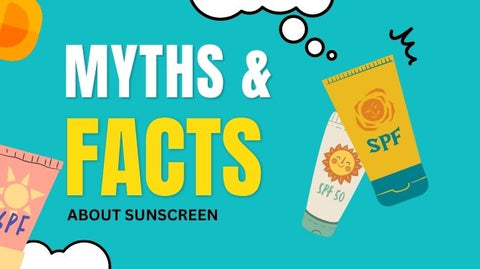
MYTH- It is not necessary to apply sunscreen if you are not going out in the sun
FACT- If it is not dark outside, then you require sunscreen. The sunlight has UV rays. If you are exposed to them, then they are harmful to you. Protect yourself with sunscreen.
MYTH- Today, I just have to stay at home, so I do not need sunscreen
FACT- UVB rays are blocked by windows, but UVA rays are not. They can enter your home through the windows and damage your skin. So even if you are not going outdoors, apply sunscreen in the morning.
MYTH- Today it's cloudy outside, so let’s skip sunscreen
FACT- You require sunscreen even when the sunlight is not strong. The truth is that anytime the body is exposed to light from the sun, it is exposed to UV rays, even if it is a cloudy day.
MYTH- If I wear sunscreen, my body will not generate Vitamin D as all sun rays will be reflected
FACT- Vitamin D is an essential vitamin for the human body, and the body can easily make it when exposed to sunlight. Clinical studies have found that people who use sunscreen maintain their Vitamin D levels, and the level does not drop. No matter how much sunscreen you use or how high the SPF is, some of the sun rays reach your skin and are sufficient to make Vitamin D.
MYTH- If I wear sunscreen, I will not get even 1% tanned
Fact- No matter how much sunscreen you use or how high the SPF is but still some of the sun rays still reach your skin, so it is important to cover your skin and wear a wide-brim hat, especially when the sun rays are very strong.
MYTH- All sunscreens with the same SPF value are equal
FACT- Only the SPF value does not measure how effective the sunscreen will be. The efficacy of sunscreen also depends on whether the sunscreen is ‘Broad Spectrum’,’ Water Resistant’ & ‘photostable’. Also, all sunscreen filters used should be safe to use.
MYTH- Every sunscreen needs to be applied every 2 hours
FACT- Only sunscreen having unstable sunscreen filters, like avobenzone, etc, need to be applied every 2 hours. If your sunscreen has good, photostable filters that last for a long time and do not degenerate when sunlight falls on them, then the sunscreen is effective for 7 hours. Ultrasun Swiss suncare brand uses high-quality photostable sunscreens, and all their sunscreens are effective for 7+ hours.
MYTH- All Sunscreens are water-resistant
FACT- All Sunscreens are not water resistant. Different ingredients need to be added to sunscreen to make it water-resistant. These ingredients make the sunscreen harder to wash off while in water. You can get to if sunscreen is water resistant by reading the label.
If it is not written on the label that the sunscreen is water-resistant, then the sunscreen will not prevent sunburn if you go into the pool or apply it when going to the beach.
MYTH- My water-resistant sunscreen will be effective even after spending 2 hours in the water
FACT- Sunscreens that claim to be water-resistant offer protection for 40 – 80 minutes underwater. If you are planning to spend more time than that in water, then you have to reapply the sunscreen.
MYTH- My makeup foundation has SPF. I do not need a separate sunscreen.
FACT- Using makeup with SPF provides some protection. But it does not work as well as sunscreen lotion. Since with makeup, you apply a light layer on your face and its consistency is thin, makeup with SPF will not protect you throughout the day. Also, you will not be applying it properly on your ears, throat, back of the neck, and other sun-prone areas. So even if your makeup has SPF, be sure to use a traditional sunscreen as well.
FAQs that people with Oily skin have related to sunscreens
- Why is gel sunscreen recommended for oily skin?
Gel sunscreens are made using water and water-soluble ingredients. The last thing you want for oily, acne-prone skin is to add more oil to it. So gel sunscreens are the best option if you have oily skin.
- What is the difference between SPF 20 and SPF 50?
SPF is a sun protection factor. SPF mainly indicates protection from UVA rays. To check out the SPF of sunscreen, laboratory tests are carried out on an untanned patch of human skin. Sunscreen is applied to the volunteer's skin and then exposed to simulated sunlight via UV lamps. These measurements are taken of how long it takes the skin to get a minimal burn when covered with sunscreen, and how long it takes to get the same minimal redness without it. Say it took 500 seconds for the skin to burn with sunscreen, and 50 seconds to burn without it. 500 is divided by 50, which is 10. The SPF is 10.
It is wrongly thought that SPF is related to time exposure. For instance, many people believe that if they normally get sunburned in one hour, then a SPF 15 sunscreen allows them to stay in the sun for 15 hours. This is not true because the sun’s intensity keeps changing as the day passes.
- What is the Difference between PA++++ and PA+++?
A PA grading system was established in Japan, which informs users of the level of UVB ray protection in sunscreen.
The PA rating system uses the Persistent Pigment Darkening Method (PPD). Human skin is exposed to UVA radiation, and it is seen how long it takes for skin to tan. And then the comparison is made between unprotected and protected skin.
A sunscreen with a PPD rating of 5 should allow an in-person to handle 5 times as much UVA exposure.
If a product’s PPD = 2 to 4, PA = PA+
If a product’s PPD = 4 to 8, PA = PA++
If a product’s PPD = 8 to 16, PA = PA+++
If a product’s PPD = 16 or higher, PA = PA++++
- How to apply sunscreen gel to oily skin in India for better results?
Apply the sunscreen 15-30 minutes before sun exposure. Spread sunscreen evenly by applying the product in one direction. Apply 1 finger of sunscreen on your face. Additionally, apply 1 finger of sunscreen on your neck and ears.
- What is the best gel sunscreen in India for Oily acne-prone skin?
Ultrasun Photo Age Control Fluid Sunscreen SPF 50 is the best gel sunscreen for Oily acne-prone skin available in India. It is a broad-spectrum sunscreen which protects your skin from UVA, UVB, Infrared & Blue Light. It is Photostable and has 7+ hours of protection. It is a non-comedogenic sunscreen and suitable for oily and acne-prone skin. Features incredibly fast-absorbing, lightweight, and non-greasy textures.
Sources-
https://en.wikipedia.org/wiki/Human_skin



